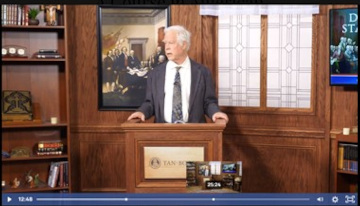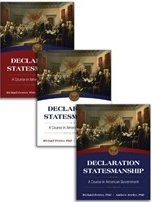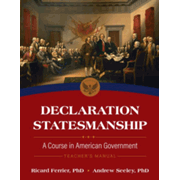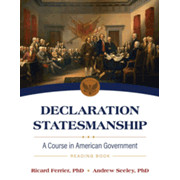Declaration Statesmanship focuses on U.S. Government, examining it through the lens of the principles outlined within the Declaration of Independence. Clearly, this is an unusual approach, but it works very well, in my opinion. The goal is to help students understand the rationale and background for the creation of the United States and our form of government. The course incorporates readings from primary sources, video lectures, discussions, writing, and independent research.
This course takes 14 weeks, so it fits the requirement for a one-semester government course for high school. You might consider using it the same year you study U.S. History, stretching it out over the school year so you can make connections to the historical timeline. The course incorporates a substantial amount of history, particularly in relation to the founding of our country, slavery, and the Civil War. It will reinforce a history course but not replace it.
Course Components
The course consists of four components: a student text, a teacher’s manual, the Declaration Statesmanship: Reading Book, and online video lectures. The text provides instructional information, reading assignments, background and context for the assigned readings, discussion questions, and research and writing assignments.
The text is written from a Christian perspective that should be common to all denominations. It also teaches students about natural law, a concept that many non-Christians throughout history have recognized as a source of moral principles. The text begins with “A Look Backward” to the formation of eighteenth-century views about government and the rights of people. With that context in mind, students explore the Declaration of Independence and the rationale used by the colonists in their revolt against England. Quite a bit of time is dedicated to the principles involved since these underlie the rest of the course. Students study the influential ideas of that time period and the tensions between them that resulted in the eventual writing of our Constitution. Further study of the Constitution itself flows naturally from this foundation. Students learn the basics regarding our federal form of government in this course, but the focus is on principles rather than minutiae.
Three of the book’s nine chapters are devoted to the topics of slavery, Abraham Lincoln, the Civil War, the subsequent treatment of blacks, Jim Crow laws, and the Civil Rights movement. All of these topics are discussed with the “Declaration Principles” in mind.
The Questions for Reflection within the chapters sometimes provide additional information with no assignment. Other Questions for Reflection might be used for discussion or short essay responses, and many of them require students to read and research in the Reading Book and other written works. Some research will almost certainly be done on the internet. The authors occasionally suggest a number of possible readings, but students are unlikely to complete all of them in a semester. Students will sometimes write essays or papers. Because of the amount of reading and writing required, a parent or teacher needs to select from among the sources and assignments. Occasionally, the authors clearly identify optional work, but it is generally left to the teacher to decide. I expect that teachers will get a feel for the amount of reading their students can handle as they get into the course, and those decisions will become easier as you proceed.
As part of the course, students will memorize some key documents such as The Declaration of Independence (at least parts of it), the Preamble to the Constitution, and the "Gettysburg Address." Recitations of these are scheduled in the lesson plans.
 The video lectures, one for each week of the course, expand upon topics within the textbook. The videos each run about a half-hour. They do not duplicate the content of the textbook; students should watch the videos and read the textbook. The lectures are presented by one of the course's authors, Richard Ferrier, who is clearly passionate about his love for America and the importance of the subject matter.
The video lectures, one for each week of the course, expand upon topics within the textbook. The videos each run about a half-hour. They do not duplicate the content of the textbook; students should watch the videos and read the textbook. The lectures are presented by one of the course's authors, Richard Ferrier, who is clearly passionate about his love for America and the importance of the subject matter.
The Reading Book contains excerpts from books such as Nichomachean Ethics, The Federalist Papers, Democracy in America, and The Second Treatise of Government, along with the entire text of, or excerpts from, a number of historic speeches and documents such as the Articles of Confederation, The U.S. Constitution, the transcript of the Dread Scott decision, and the sixth Lincoln-Douglas Debate. While students can find all of these readings elsewhere, having them already gathered in one place with the specific sections of the readings pre-selected is a big time-saver. Some of the readings are followed by a series of questions within the Reading Book.
The teacher’s manual has lesson plans at the front so you can quickly see what should be accomplished each day. Following this is a section titled Teaching Strategies. For each chapter, the teaching strategies include a chapter outline and background notes that summarize or develop the main themes. Next, is a section titled Comments on the Questions for Reflection. It has valuable notes for the teacher as well as some predictable answers. However, students will be learning to think, reason, and arrive at their own conclusions regarding many of these topics. This means that answers won't always be predictable, and the questions should lead to some lively discussions! The teacher's manual also has quizzes and tests along with the answer keys for chapter review questions, questions on some assigned readings, the quizzes, and the tests.
Summary
The text can be taught in a group setting, or it can be used by a student completing most work independently while working under the guidance of a teacher or parent. Discussing some of the questions and sharing discoveries will definitely make this course much more valuable, so I recommend trying to gather two or more students to work through it together, meeting at least once a week.
Declaration Statesmanship is a U.S. Government course with a much larger purpose than simply conveying the mechanics of our form of government. Toward the end of the course, the authors raise the issue of freedom versus license, pointing out that in our modern culture license leads people to indulge their desires without rationally considering the end result—a false idea that equates freedom with a license to do whatever we please. They point out how this denies natural law and leads to relativity and the loss of true morality. They tie this to the breakdown of marriage and the family, the reduction of education to “education for the workforce,” and the removal of God from public life. All of this is designed to demonstrate to the student that adherence to the Declaration Principles offers a blueprint for civic renewal if people so choose.












